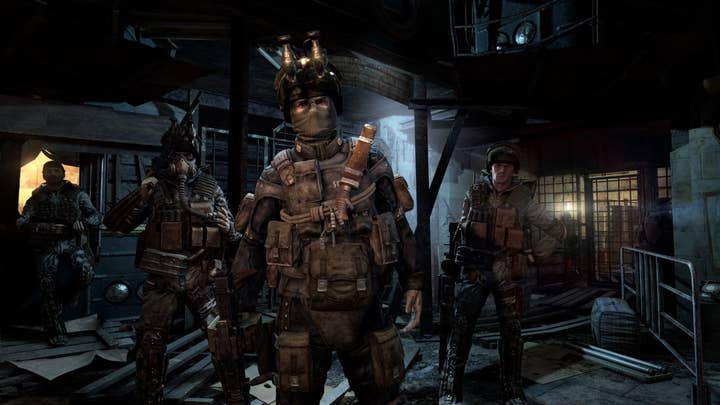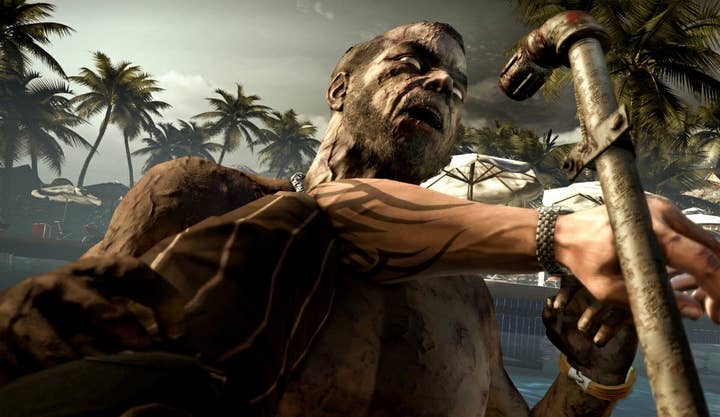Koch Media: "We are not ambitious to be the next THQ"
CEO Klemens Kundratitz on THQ's collapse, the acquisition of Saints Row, and the problem with half-naked statuettes
We tend to talk about the companies that comprise the industry's publishing arm in terms of tiers. The platform holders, the Activisions and the EAs are at the very top, looking down as the likes of Ubisoft, Take-Two and Square Enix try to climb the ladder. During the latter years of its existence, THQ was just below that level, and this relatively broad middle-tier is the part of the industry that suffered most from the huge changes wrought by the rise of more egalitarian digital platforms.
As Rob Fahey pointed out in a recent editorial, THQ was the victim of a rapidly shifting marketplace that defeated the company's mostly smart attempts to regain its balance. When the time came to carve up the company's assets for the highest bidder, it was hard not to feel discouraged by the quality of its constituent parts: very talented studios and very promising games that, given more time, may well have been the shot in the arm THQ required. Business is like that, and generally speaking a loss for one turns into a win for others.
"THQ was missing the AAA success which, for other companies, covers up the things that aren't going so well"
Klemens Kundratitz, CEO, Koch Media
Koch Media might well count itself among those winners. The German media group has been a relatively mysterious presence in the games industry since it launched its publishing division, Deep Silver, in 2002. It has been consistently active, particularly in Europe, but it lacked the sort of breakout hit that brings truly widespread recognition. Techland's Dead Island went some way towards achieving that, but the acquisition of Volition Inc. and Metro: Last Light could be the catalyst for its ascent to AAA development. It will be a stiff challenge, but CEO Klemens Kundratitz believes that Koch has the experience and the infrastructure to avoid the problems evident in THQ's demise.
"Many people didn't really see us as a player in the industry. They didn't really understand what we're doing," he says. "I appreciate that we now get more of the spotlight with these new IPs, but, having said that, we are not ambitious to be the next THQ.
"We have always tried to find our own way, and do business in a way that we believe is right for us. We don't want to copy other people's success stories. We are passionate about Deep Silver, and we are obviously investing significantly now, but at the same time we have a strong, value-added distribution business in Europe, which will continue to be a tent-pole in the future. And the third element is our film business, which we are also growing here in Europe, where we acquire film rights and we exploit them in the movies, in home entertainment and on TV.

"Those three elements of the business are all in a growth phase. Standing on three legs rather than one is still quite a good idea as far as we're concerned."
Kundratitiz believes that the spread of Koch's business will offer security when navigating the pitfalls of AAA console development. Given the industry-wide transition from physical to digital, the company's European distribution services have proved particularly attractive, yielding strong relationships with companies like Capcom, Square Enix and NCsoft. According to Kundratitz, Koch is actually seeing the benefits of the ongoing consolidation of the retail market.
Nevertheless, the company will be "built around" Deep Silver, particularly now that it has added Saints Row and Metro to its IP stable. Indeed, the desire for those particular assets was enough to prompt Koch to enter the bidding high, ultimately paying a total of $28.1 million. "We started with quite substantial bid amounts," says Kundratitz. "It wasn't about a free ride. It was a real desire to get those two assets. Were there other things of interest? Yes, but in the end we got exactly what we wanted."
"It's important that you understand who you are and what you're capable of doing. Other publishers are very ambitious, but they aspire to grow their businesses in ways that aren't healthy"
"It's important that you understand who you are and what you're capable of doing. Other publishers are very ambitious, but they aspire to grow their businesses in ways that aren't healthy. That's a problem of publicly listed companies, which go from quarter to quarter and are pushed into this ambitious way of running their businesses. Unfortunately, that doesn't always pay off.
"In THQ's situation there were a combination of factors that contributed to that. One is that they were missing the AAA success which, for other companies, covers up the things that aren't going so well. Secondly, they were somewhat exposed by the quick turn of the market: the influence of Apple, and the crystallisation of the core business as the only full-price business around. It's hard to turn a tanker in a short period of time."
Kundratitz says that he has "no doubt" that Metro: Last Light and the next Saints Row game will both launch this year, just as THQ had planned. More to the point, he sees Koch as an ideal fit for both IPs: it has great strength in Europe, where Metro is likely to find its biggest audience, and its independence will give Saints Row the sort of creative freedom that it might not have received under the more homogenised console development culture of a publisher like EA. The way the company built the success of Dead Island is proof, Kundratitz says, that it is more than ready to handle a property the size of Saints Row.
"I think it would have been daunting two years ago, but we have really come a long way since we started publishing. Admittedly, we started small and focused on Europe, but we went step-by-step, making bigger bets and making bigger products. Not all of them have been successful, as with any publisher, but it's been organic growth.
"With Dead Island, for the first time we had a global success. One thing leads to the next, and after Dead Island to go a bigger step further, it's not something we don't know enough about. We have grown and matured as an organisation in a way that enables us to take on a project of that size."

Ah yes, Dead Island. The franchise that arguably put Koch in a position to take advantage of THQ's assets has become a dubious example of surprise success. When every other week seems to bring the news of another developer making redundancies or closing altogether, unconventional hits like Dead Island should be a thing to savour. But the combination of misleading (albeit entirely successful) marketing and an improbable snafu involving the discovery of a sexist line of code made that somewhat difficult.
"You can't get every bet right. Sometimes you just have to admit to yourself and your community that it wasn't appropriate"
Indeed, the recent announcement of a Collector's Edition for the forthcoming sequel, Riptide, which is packaged with a statue of a mangled, pneumatic female torso, has led to accusations that Koch is deliberately using sensationalist tactics to promote the games. After all, with so much discussion around gender politics in both the industry and its products in recent months, a decapitated, scarred swimsuit model is a fairly effective way of starting a conversation. However, Kundratitz firmly denies any conscious attempt to fan the flames, and he believes the Dead Island IP will not be dragged down by the media scrutiny.
"Well, you can't get every bet right. Sometimes you just have to admit to yourself and your community that it wasn't appropriate," he says. "Overall, Riptide has a very strong tailwind going into the launch, and I think the Collectors Edition will probably be soon forgotten. It's something that the media has reported with a lot of interest, but I think that in the grand scheme of things it's not so important.
"And, y'know, we'll probably make mistakes in the future as well. It's not something we're immune to. Looking at what we've seen in response on the forums and around the internet, many people also see it in a more balanced way, and recommend that if some people don't want to buy something they just shouldn't buy it.
"I can tell you one thing: it was not manufactured. We aren't looking for that type of publicity."

